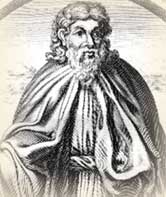 In our present-day battle with Gnosticism and in view of our upcoming seminar, I think it’s worthwhile to reflect on our predecessor in this long war, Irenaeus.
In our present-day battle with Gnosticism and in view of our upcoming seminar, I think it’s worthwhile to reflect on our predecessor in this long war, Irenaeus.
Consider the Gnostic’s notion that they possess some secret knowledge conveyed to them by oral tradition, originating with Christ Himself. Even today’s Gnostics labor to find an historical continuity to their beliefs. So, if this were true, Irenaeus would surely be a Gnostic. For it was he who learned from Polycarp, who learned from the Apostle John, who, as we all know, learned from Christ. Surely, John would have whispered this knowledge into the ear of Polycarp.  And Polycarp, you would think, would have whispered the same into the ear of Irenaeus. If this is the way it happened, Gnosticism has solid footing.
And Polycarp, you would think, would have whispered the same into the ear of Irenaeus. If this is the way it happened, Gnosticism has solid footing.
Yet, we know that Christ made a point of teaching everything in full view of the public eye, not withholding anything from anyone. He told Annas the high priest, “I have spoken openly to the world. I always taught in synagogues or at the temple, where all the Jews come together. I said nothing in secret.”
Ok, so Jesus says He taught nothing in secret, but I guess that’s not quite true. The Gnostics say he did. So, who did Jesus tell these secrets too? You’d think he would have told John, the apostle ‘whom Jesus loved’. And John would have told Polycarp, and Polycarp, Irenaeus. Yes, definitely. Irenaeus would be the one to establish Gnosticism. He’s got the right connections. So, what did Irenaeus have to say about all this? Let’s take a look.
Fortunately, we have Irenaeus’ complete five-volume work to take a look at. It’s called ‘Against Heresies’ which scholars believe was written around 180 A.D. So, what heresies was Irenaeus concerned about? Was it that the idea that Jesus is the eternal Son of God, that He became a man, that He really died on the Cross and resurrected from the dead? Surely, these must be the heresies that Irenaeus would be speaking about. After all, these are the things that Gnostics detest, and Irenaeus would detest them too. Right?
But wait. Upon closer examination, the book’s name, ‘Against Heresies’ is the common name for it. Actually, Irenaeus named it, ‘On the Detection and Overthrow of the So-Called Gnosis.’ Wow, that doesn’t sound too good for the Gnostics. Perhaps Irenaeus wasn’t a Gnostic after all. Perhaps he was Gnosticism’s greatest enemy. Hmmm….
He begins the first volume by stating, “I have felt constrained, my dear friend, to compose the following treatise in order to expose and counteract their [Gnostics] machinations.” This, then, is the beginning of his vicious attack on the Gnostics, not mincing words. Here’s a few excerpts:
“These men falsify the oracles of God, and prove themselves evil interpreters of the good word of revelation.”
“By means of specious and plausible words, they cunningly allure the simple-minded to inquire into their system; but they nevertheless clumsily destroy them, while they initiate them into their blasphemous and impious opinions.”
If you ever tadalafil for sale visit the doctor the only treatment he would let you know about is, the treatment through medication. The most general brand title medications include viagra for cheap , Fioricet, viagra, and Soma. Erectile dysfunction has many causes and a variety of viagra cialis levitra treatment. Deep even breathes are best, breathing in deeply as well as breathing completely out. http://www.cerritosmedicalcenter.com/pid-6048 commander cialis “But it [Gnosticism] is craftily decked out in an attractive dress, so as, by its outward form, to make it appear to the inexperienced (ridiculous as the expression may seem) more true than the truth itself.”
“Their language resembles ours, while their sentiments are very different.”
“I exhort everyone who will listen to avoid such an abyss of madness and of blasphemy against Christ.”
“I shall also endeavor, according to my moderate ability, to furnish the means of overthrowing them, by showing how absurd and inconsistent with the truth are their statements”
“Such, then, is their system, which neither the prophets announced, nor the Lord taught, nor the apostles delivered, but of which they boast that beyond all others they have a perfect knowledge.”
In addition to these statements, Irenaeus goes on to name names. His readers are not left wondering who he is talking about. Of particular concern was Valentinus.
“I refer especially to the disciples of Ptolemaeus, whose school may be described as a bud from that of Valentinus.”
Furthermore, Irenaeus goes on to attack Cerinthus, the Ebionites, Nicolaitanes, Carpocrates, Saturninus, Basilides, Simon Magus, Menander, Marcosians, Ptolemy, Colorbasus, and especially Valentinus.
So, this was the spirit of the man Irenaeus. He had a huge impact on the Church which still endures. I suggest we need to adopt his attitude, and take up the fight with the same vigor. Please sign up for our seminar, and enter into this war!

